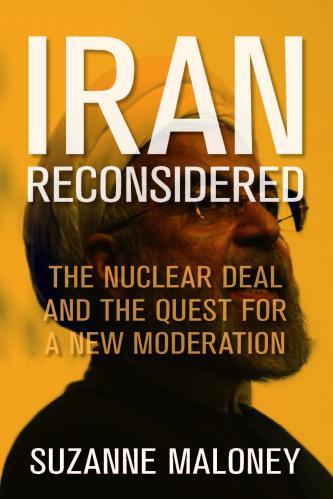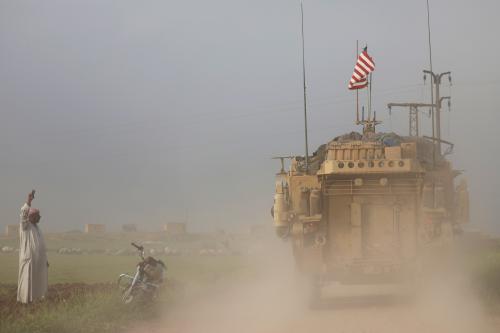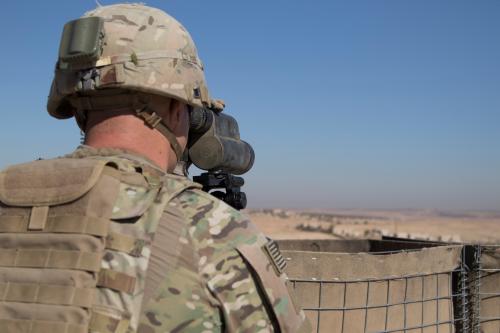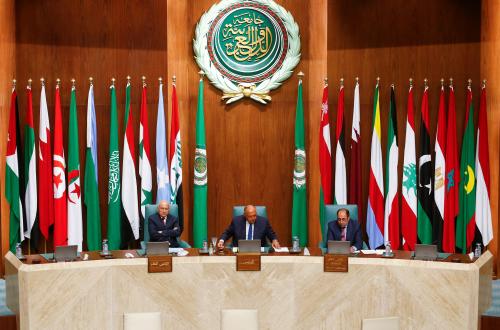There are ways to reduce the dangers to the republic and to America’s allies around the world. John R. Allen and Michael O’Hanlon argue that there’s a key role for Congress. This piece originally appeared in The Hill.
All presidents have the right to make mistakes, and one man’s error is often another’s smart policy call.
But the capricious, impulsive way in which President Donald Trump chose to pull the plug quickly on several tens of thousands of Kurdish allies of the United States who have been risking life and limb to help us defeat ISIS in Syria seems such an egregious decision—made in such an unpresidential way—that it should beg the question of how we can improve White House decision-making to prevent even worse things from happening in the future.
Syria is important, but it is not a top-tier U.S. national security priority. What if, next time, the issue is a possible preemptive attack against North Korea’s nuclear forces or a violent naval confrontation with China or a showdown against Russia over a Baltic nation, where the stakes would be even higher?
The Syria mistake seems like a truly unforced error for America, as reflected in the fact that it contributed significantly to the resignations of two remarkable Americans who have served presidents of both parties admirably for many years, former Secretary of Defense Jim Mattis and former coordinator of the campaign against ISIS, Brett McGurk.
After years of floundering, for which Trump himself bears no blame, the United States had finally found a workable low-cost strategy against violent extremism in Syria. It goes something like this:
- Continue to work with the Kurdish-based opposition to destroy the remnants of ISIS, which, make no mistake, is down but not yet out.
- Work with Turkish President Recep Tayyip Erdogan to ensure that Kurdish terrorists in Turkey do not benefit from the melee, but also avoid kowtowing to Ankara over every tactical detail of future operations.
- Help local allies sustain a semi-safe zone in the country’s northeast, and in the northwest around Idlib, until a negotiated peace deal can assure their safety.
- Keep Iran out of those parts of the country and begin the reconstruction process that is crucial to preventing a return of what could be an even deadlier extremist movement next time.
- Withhold American and Western reconstruction aid for Syria until such a deal can be worked out, and use the prospect of such aid as leverage with Syrian President Bashar al-Assad (even if pushing him completely from power in the short term may now be unrealistic).
That Trump’s decision to quickly undo all the above was made impromptu, in the immediate aftermath of a phone call with a dubious American ally in Ankara and without proper consultation with those who would have to manage the consequences of the change, is deeply troubling.
Indeed, Trump has brought us to the precipice of a full-blown crisis in civil-military relations. But in fact, the problem goes even further. The very essence of constitutional checks and balances on the president risks being lost, with potentially perilous results.
How can the country, and the White House, let Trump be Trump on Twitter and behind the microphone—something that the president will clearly insist upon—but at the same time create due process in making weighty and time-critical decisions about this country’s future security?
This question should be of grave interest not only the new Congress, but Trump’s supporters and advisors as well. There may be no perfect answer. Good process cannot prevent bad decisions, and our Constitution accords huge powers to the president that cannot be overturned based on the latter’s personality or decision-making style.
But there are ways to reduce the dangers to the republic and to America’s allies around the world.
Three recourses seem prudent. First, the chairs and ranking members of armed services and foreign relations committees in both houses of Congress should convene hearings immediately to demand an explanation of how we ended up here on Syria and Afghanistan.
In the case of Syria, we should all be thankful Sen. Lindsey Graham (R-S.C.) has mounted an intervention with the president that may have bought more time on the withdrawal decision, but it is a terrifying means of restraining Trump’s worst instincts.
The 116th Congress needs to bring back high-profile hearings on key matters facing the nation, improving the public’s awareness on key issues and therefore raising the bar on how quickly and flippantly the White House can change course on major national security issues.
Second, the new Congress should renew the 2001 Authorization on the Use of Military Force (AUMF) to re-establish its own role in national security decision-making and to clarify the limitations on unilateral presidential action.
A new law should allow some leeway for limited action against new terrorist groups that may emerge under different names and in different places. But it should underscore that no large-scale military operations, and no conflicts against nation states, could be taken without further congressional approval.
It should also consider a time limitation on the future AUMF (allowing a waiver in case a future Congress does not act to repeal or replace it in time).
Third, Congress or the president should formalize the national security decision-making process, effective immediately. Simple presidential statements or tweets should no longer be used to set policy. Instead, official national security decision directives should be required, as has often been the practice with past presidents.
This new policy should be retroactive so that the president’s recent comments about Syria and Afghanistan would therefore be reinterpreted as presidential aspirations, not current and actionable policy, which have shaken our national security community and our allies as well.
It may be too late to bring back Secretary of Defense Mattis, but it is not too late to save America and its allies from the potentially disastrous consequences of rash changes of course in Syria and Afghanistan. It is definitely not too late to head off even worse catastrophes in theaters like East Asia or in central and eastern Europe.
The Founding Fathers, through the Constitution, gave the Congress power over the budgetary appropriations process as well as over decisions on whether to go to war.
The latter prerogative has been muddied by the nature of post-World War II foreign policy, but the principle that no president should be able to make decisions on matters of war and peace unilaterally within the U.S. government remains.
Indeed, the Constitution goes even further, creating checks on the president even within the executive branch. It is for such a reason that the president has a cabinet and that the Senate is charged with confirming cabinet officials as well as senior departmental leadership, who are properly seen as serving not just the president, but the Congress and the nation as well.
The confirmation process culminates with confirmed officials swearing an oath to support and defend the Constitution of the United States. They do not swear an oath of personal loyalty to a president.
The president may have nominated the individual, but has no claim on that person’s loyalty in any sense that supplants that person’s inherent obligation to the Constitution of the United States. Thus, the brilliance of our Founders is on full display.
The genius of American democracy is not, fundamentally, about winner-take-all elections. It is about the proper functioning of a system of checks and balances—at the federal level and throughout the land—not only on matters of domestic policy but on the highest issues of war, peace and national security.







Commentary
Learning from Trump’s Syria debacle—What Congress can do
January 7, 2019